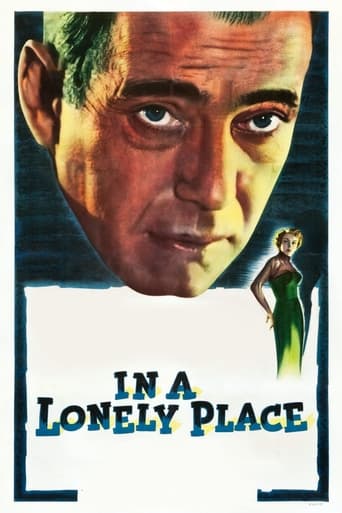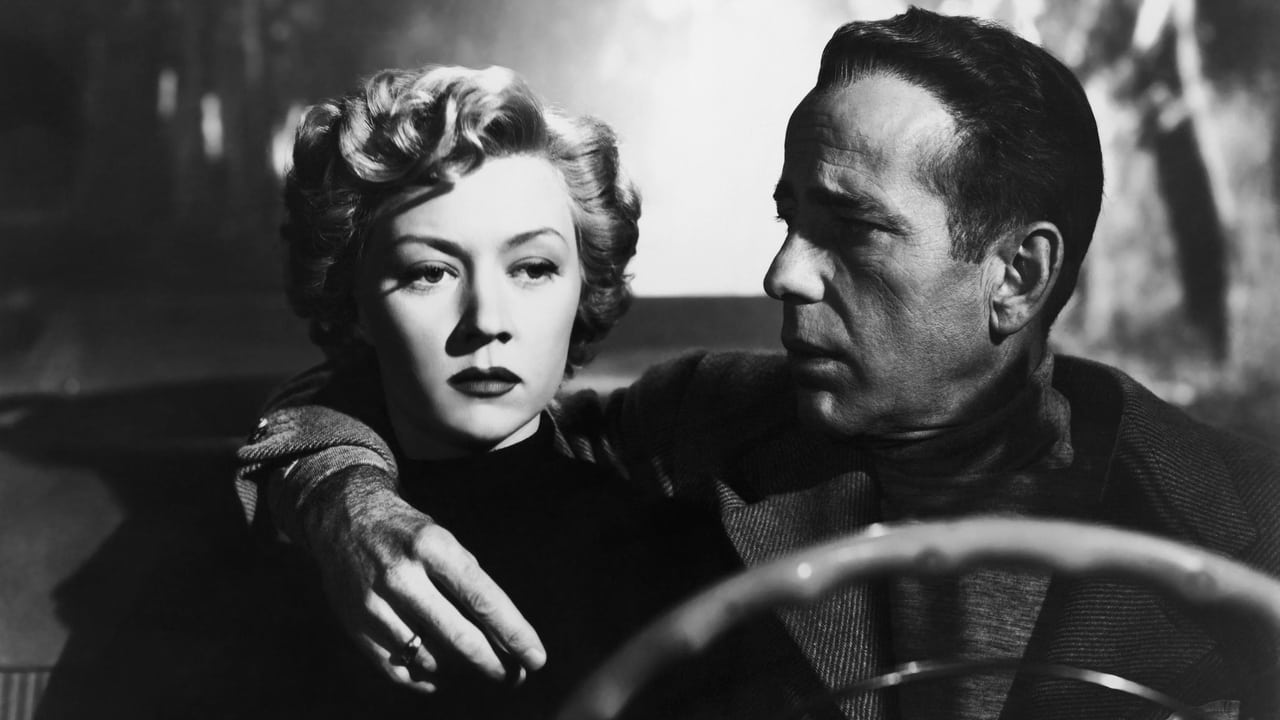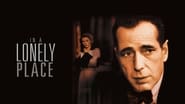Antonius Block
Humphrey Bogart turns in an outstanding performance in this gritty film noir about an aging screenwriter suspected of murder. One evening he takes a young checkroom woman home with him to talk about a book, and after she leaves that night, she's strangled in a car and dumped. His neighbor (Gloria Grahame) provides what seems to be an alibi, and then the two begin having an amorous relationship. The police, however, continue investigating him, and they have reason to, because Bogart is quite a hothead. He has a 'take no prisoners' approach to life, is unafraid of police questioning, and lets his fists do the talking when he flies into a rage, which he does several times. There is a pathos to Bogart's flaws, which seem to have doomed him to life 'in a lonely place', despite his big heart and authenticity as a person. He just can't help himself when he does things he later regrets, and yet he "he has to explode sometimes," as his agent puts it. He always apologizes afterwards, sometimes in quiet ways, and he's also fiercely protective of friends, including an old actor with a predilection for drinking. He's aging, fighting the system, and fighting himself. We can't help but feel for him, even if he scares us. Bogart's eyes in the moments when he's explaining what must have happened during the murder to his police friend and his wife are truly frightening. It's hard to believe he wasn't nominated for an Oscar for his performance.In one of the most touching scenes, he's driving with Grahame and says "I was born when she kissed me. I died when she left me. I lived a few weeks while she loved me." They're lines he's trying to work into one of his scripts, but one senses real pain from his past. In another fantastic scene, the two are in the kitchen after she's read his script, and he's clumsily trying to cut her a grapefruit for breakfast. In what defines his gruff yet tender character, after she's complemented the love scene in the script, he says "That's because they're not always telling each other how much in love they are. A good love scene should be about something else besides love. For instance, this one. Me fixing grapefruit, you sitting over there, dopey, half-asleep. Anyone looking at us could tell we're in love."Grahame falls for him, and as improbable as the romance may seem, the pair have chemistry, and play their conflicted roles well. She shows great range as their relationship goes through stages, and without spoiling anything, I'll just say that things get difficult for her as Bogart gets erratic, and she realizes he may have committed the crime.Director Nicholas Ray is taut in his story-telling, and there is a wonderful atmosphere to the film, such as when the two are in a nightclub sitting at a piano with other couples as Hadda Brooks performs "I Hadn't Anyone Till You", drinking and murmuring to one another. "Anything you want to make you happy?" he asks. "I wouldn't want anyone but you," she whispers. There is a sophistication to how people dressed and spoke in movies like this one, a coolness to the way they drank and smoked, and yet it's juxtaposed with violent passion and tragic flaws. The overall emotional effect of the film is like a punch to the gut, and much stronger because of its revised (and apparently improvised) ending. This is no-nonsense, fantastic film noir.
marshrydrob
The opening scene and music, they are suggestive of a mystery/ thriller. Humphrey Bogart driving in the city at night, is a fitting way to open the viewers to the film.
Immediately, we find out Bogart's character; is a screen writer by the name of Dixon Steele. This is a good name for a Humphrey Bogart character.
Steele's first stop, is a diner called Paul's. Here we find out that Dixon Steele is a hard- boiled aging man, with an explosive temperament.
The first woman encountered by Bogart, a novelist the name of Mildred. as with other roles, Humphrey Bogart is consistent in his acting. he seems familiar in character to many of his other roles. I believe, Bogart puts a lot of himself into his acting.
The novelist, after leaving Dixon Steele's residence; is found murdered, and the police focus on Bogart's character as the prime suspect.
Gloria Grahme's character, Miss gray; makes her first appearance at the police station, while Dixon Steele is being questioned by detectives. This leads to a romantic interest between Steele and Gray, and the movie moves forward from there.
The actors- Humphrey Bogart, and the rest of the assigned talent for the film; they all play well off of Gloria Grahme's acting talent.
The ending is unexpected. This film introduces a great gathering of talent, a great story. In a Lonely Place, is a great movie. I would recommend this movie to all fans of classical film.
og_swifty
In a Lonely Place is one of the two successful movies produced by Santana Productions, company owned by Bogart himself and named after his yacht. Humphrey appears in a role of down-on-luck screenwriter Dixon Steele who struggles to write a good script. Without saying anything else that might be considered a spoiler, his acting was highly praised by back-then movie critics and is considered as one of his best movies ever made. I personally don't agree with these critics and found his acting a bit .. weird, maybe because he was visibly getting old and his wild lifestyle started to take its toll on him.What is also important to mention is how did Gloria Grahame get the main role (which later become one of her finest ever)? Well, Laurel Gray was initially supposed to be portrayed by Humphrey's wife (and fine actress indeed) Lauren Bacall but she was contracted to Warner Bros and they decided to not release her of their contract for the movie produced by independent Santana Productions in a fear of becoming a threat to their monopoly. The second option was casting Ginger Rogers (the big star of 30's and 40's) but director Nicholas Ray stepped in and decided to cast his own wife - Gloria Grahame. That later turned out to be one of the few good decisions he has made in regard to this movie. Despite the Gloria's fine acting, her marriage with Ray was deteriorating, ending up with Ray catching Gloria in bed with his 13 year old son.. well, she sure was a man- eater, lol.At last but not least, we have to compare the final version with its novel predecessor by Dorothy Hughes. In a novel, Dixon Steele is only pretending to be a screenwriter, in fact he is just living lavish lifestyle thanks to money from his rich uncle. He is also helping his friend Det. Stg. Brub track a serial killer and is later exposed that the serial killer is no one else but Steele himself. All this that happened in a novel did not happen in a movie itself so if you haven't watch the movie yet, don't worry - the story is a bit different. Writer Hughes describes Steele as a violent psycho and misogynist (back then wide known American social issue) and who knows, maybe Humphrey didn't have to play this part much ;) The ending itself was also changed (thank you Ray!) and in my personal opinion that affected the movie in not exactly favorable way. I won't describe the different but let's say that tragic ending would suit the whole movie better.To sum this up, movie is definitely worth watching. Besides Gloria Grahame, I'd like to point out fine acting of Frank Lovejoy and Martha Stewart whose presence I enjoyed a lot. Altogether 85%.
Tim Daldrup
The review contains some very light spoilers:After watching this Bogey movie I am in various ways shocked! First of all I am shocked I never saw this picture before. Second I am shocked of Bogart's performance. This was tremendous! On the one hand so dark, deeply self-destructive and desperate, the mind of a writer oscillating between the fascination of the violence, which he puts in his screenplays and the film noir generic heavy, but belated regret - on the other hand so gentle swaying and charming, causing an extraordinary desire in us to be accepted by our environment, to be accepted by him. Bogart's face does the rest. After all he remains in the people's head as one of the untouchables, whom about nowadays only few living human beings can tell us. Third I am shocked of the dramaturgical brilliance of this film. The vehicle to generate tension through leaving the audience in the unknown of whether their favorite character is a murderer or not finds perfection here. Nicholas Ray proceeds with us to a roller coaster drive of hope, anger, fear and satisfaction. Even if this is a pre-Strassberg movie all the actors do a very good job. Jeez they even move pretty much around and interact with the other cast members instead of staying at one designated spot. Especially Bogart and Gloria Grahame perform together very intensively. Laurel Gray seems to be so afraid of Dixie Steele at some point I was concerned about, if all this wasn't just acting on the set. At last we also can find some obvious, but really cool meta-thoughts on theater and the Hollywood star- and production system at that time. Or you just smile at the scene, where Nicholas Ray tries to convince the audience through the actors and explicit dialogue that this particular one is the perfect love scene. Well hats off for "In a Lonely Place"! Watch it, you won't regret it.



 AD
AD





